 Полная версия
Полная версияLittle Lucy's Wonderful Globe
Crack, crack, went the whip; the dogs yelped with eagerness,—they don't bark, those Northern dogs; the little Kamschatkadale bawled louder and louder, and never saw when Lucy rolled off behind, and was left in the middle of a huge snowdrift, while he flew on with his load.
Here were his father's dogs overtaking her; picking her—some one picking her up. No, it was Don! and here was Mrs. Bunker exclaiming, "Well, I never thought to find Miss Lucy in no better a place than on Master's old bearskin!"
CHAPTER X.
THE TURK
"What a beautiful long necklace, Mrs. Bunker! May I have it for Lonicera?"
"You may play with it while you are here, Missie, if you'll take care not to break the string, but it is too curious for you to take home and lose. It is what they call a Turkish rosary; they say it is made of rose-leaves reduced to a paste and squeezed ever so hard together, and that the poor ladies that are shut up in the harems have little or nothing to do but to run them through their fingers."
"It has a very nice smell," said Lucy, examining the dark brown beads, which hung rather loosely on their string, and letting them fall one by one through her hands, till of course that happened which she was hoping for: she woke on a long low sofa, in the midst of a room all carpet and cushions, in bright colours and gorgeous patterns, curling about with no particular meaning; and with a window of rich brass lattice-work.
And by her side there was an odd bubbling, that put her in mind of blowing the soap-suds into a honey-comb when preparing them for bubble blowing; but when she looked round she saw something very unlike the long pipes her brother called "churchwardens," or the basin of soap-suds. There was a beautifully shaped glass bottle, and into it went a long, long twisting tube, like a snake coiled on the floor, and the other end of the serpent, instead of a head, had an amber mouth-piece which went between a pair of lips. Lucy knew it for a hubble-bubble or narghilhe, and saw that the lips were in a brown face, with big black eyes, round which dark bluish circles were drawn. The jet-black hair was carefully braided with jewels, and over it was thrown a great rose-coloured gauze veil; there was a loose purple satin sort of pelisse over a white silk embroidered vest, tied in with a sash, striped with all manner of colours, also immense wide white muslin trousers, out of which peeped a pair of brown bare feet, which, however, had a splendid pair of slippers curled up at the toes.
The owner seemed to be very little older than Lucy, and sat gravely looking at her for a little while, then clapped her hands. A black woman came, and the young Turkish maiden said, "Bring coffee for the little Frank lady."
So a tiny table of mother-of-pearl was brought, and on it some exquisite little striped porcelain cups, standing not in saucers, but in silver filigree cups into which they exactly fitted. Lucy remembered her Chinese experience, and did not venture to ask for milk or sugar, but she found that the real Turkish coffee was so pure and delicate that she could bear to drink it without.
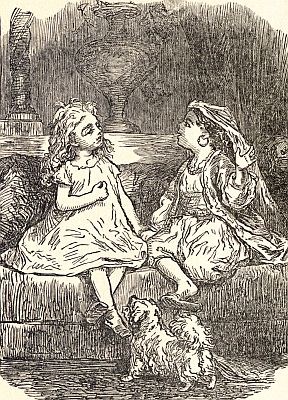
"Married! Oh, no, you are joking."
"Where are your jewels?" then asked the little hostess.
"I'm not old enough to have any?"
"How old are you?"
"Nine."
"Nine! I'm only ten, and I shall be married next week–"
"Married! Oh, no, you are joking."
"Yes, I shall. Selim Bey has paid my father the dowry for me, and I shall be taken to his house next week."
"And I suppose you like him very much."
"He looks big and tall," said the child with exultation. "I saw him riding when I went with my mother to the Sweet Waters. 'Amina,' she said, 'there is your lord, in the Frankish coat—with the white horse.'"
"Have you not talked to him?"
"What should I do that for?"
"Aunt Bessie used to like to talk to nobody but Uncle Frank before they were married."
"I shall talk enough when I am married. I shall make him give me plenty of sweetmeats, and a carriage with two handsome bullocks, and the biggest Nubian black slave in the market to drive me to Sweet Waters, in a thin blue veil, with all my jewels on. Father says that Selim Bey will give me everything, and a Frank governess. What is a governess? Is it anything like the little gold case you have round your neck?"
"My locket with Mamma's hair? Oh, no, no," said Lucy, laughing; "a governess is a lady to teach you."
"I don't want to learn any more," said Amina, much disgusted; "I shall tell him I can make a pillau, and dry sweetmeats, and roll rose-leaves. What should I learn for?"
"Should you not like to read and write?"
"Teaching is only meant for men. They have got to read the Koran, but it is all ugly letters; I won't learn to read."
"You don't know how nice it is to read stories, and all about different countries. Ah! I wish I was in the schoolroom, at home, and I would show you how pleasant it is."
And Lucy seemed to have her wish all at once, for she and Amina stood in her own schoolroom, but with no one else there. The first thing Amina did was to scream, "Oh, what shocking windows! even men can see in; shut them up." She rolled herself up in her veil, and Lucy could only satisfy her by pulling down all the blinds, after which she ventured to look about a little. "What have you to sit on?" she asked, with great disgust.
"Chairs and stools," said Lucy, laughing and showing them.
"These little tables with four legs! How can you sit on them?"
Lucy sat down and showed her. "That is not sitting," she said, and tried to curl herself up cross-legged; "I can't dangle down my legs."
"Our governess always makes us write out a tense of a French verb if she sees us sitting with our legs crossed," said Lucy, laughing with much amusement at Amina's attempts to wriggle herself up on the stool whence she nearly fell.
"Ah, I will never have a governess!" cried Amina. "I will cry, and cry, and give Selim Bey no rest till he promises to let me alone. What a dreadful place this is! Where can you sleep?"
"In bed, to be sure" said Lucy.
"I see no cushions to lie on."
"No; we have bedrooms, and beds there. We should not think of taking off our clothes here."
"What should you undress for?"
"To sleep, of course."
"How horrible! We sleep in all our clothes wherever we like to lie down. We never undress but for the bath. Do you go to the bath?"
"I have a bath every morning, when I get up, in my own room."
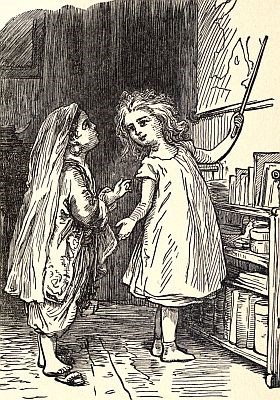
"I will show you where you live. This is Constantinople."
"Bathe at home! Then you never see your friends? We meet at the bath, and talk and play and laugh."
"Meet bathing! No, indeed! We meet at home, and out of doors," said Lucy; "my friend Annie and I walk together."
"Walk together! what, in the street? Shocking! You cannot be a lady."
"Indeed I am," said Lucy, colouring up. "My Papa is a gentleman. And see how many books we have, and how much we have to learn! French, and music, and sums, and grammar, and history, and geography."
"I will not be a Frank! No, no! I will not learn," said the alarmed Amina on hearing this catalogue poured forth.
"Geography is very nice," said Lucy; "here are our maps. I will show you where you live. This is Constantinople."
"I live at Stamboul," said Amina, scornfully.
"There is Stamboul in little letters below—look."
"That Stamboul! The Frank girl is false; Stamboul is a large, large, beautiful place; not a little black speck. I can see it from my lattice. White houses and mosques in the sun, and the blue Golden Horn, with the little caiques gliding."
Before Lucy could explain, the door opened, and one of her brothers put in his head. At once Amina began to scream and roll herself in the window curtain. "A man in the harem! Oh! oh! oh! Were there no slippers at the door?" And her screaming brought Lucy awake at Uncle Joe's again.
CHAPTER XI.
SWITZERLAND
"I liked the mountain girl best of all," thought Lucy. "I wonder whether I shall ever get among the mountains again. There's a great stick in the corner that Uncle Joe calls his alpenstock. I'll go and read the names upon it. They are all the mountains where he has used it."
She read Mount Blanc, Mount Cenis, the Wengern, and so on; and of course as she read and sung them over to herself, they lulled her off into her wonderful dreams, and brought her this time into a meadow, steep and sloping, but full of flowers, the loveliest flowers, of all kinds, growing among the long grass that waved over them. The fresh clear air was so delicious that she almost hoped she was gone back to her dear Tyrol; but the hills were not the same. She saw upon the slope quantities of cows, goats, and sheep, feeding just as on the Tyrolese Alps; but beyond was a dark row of pines, and up above, in the sky as it were, rose all round great sharp points—like clouds for their whiteness, but not in their straight jagged outlines; and here and there the deep grey clefts between seemed to spread into white rivers, or over the ruddy purple of the half-distance came sharp white lines darting downwards.
As she sat up in the grass and looked about her, a bark startled her. A dog began to growl, bark, and dance round her, so that she would have been much frightened if the next moment a voice had not called him off—"Fie, Brilliant, down; let the little girl alone. Fi donc. He is good, Mademoiselle, never fear. He helps me keep the cows."
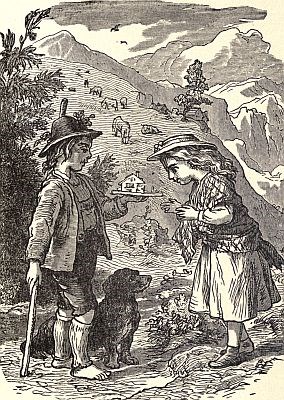
"I cut it out with my knife, all myself."
"Who are you, then?"
"I am Maurice, the little herd-boy. I live with my grandmother, and work for her."
"What, in keeping cows?"
"Yes; and look here!"
"O the delicious little cottage! It has eaves, and windows, and balconies, and a door, and little cows and sheep, and men and women, all in pretty white wood! You did not make it, Maurice?"
"Yes, truly, I did; I cut it out with my knife, all myself."
"How clever you must be. And what shall you do with it?"
"I shall watch for a carriage with ladies winding up that long road; and then I shall stand and take off my hat, and hold out my cottage. Perhaps they will buy it, and then I shall have enough to get grandmother a warm gown for the winter. When I grow bigger I will be a guide, like my father."
"A guide?"
"Yes, to lead travellers up to the mountain-tops. There is nowhere you English will not go. The harder a mountain is to climb, the more bent you are on going up. And oh, I shall love it too! There are the great glaciers, the broad streams of ice that fill up the furrows of the mountains, with the crevasses so blue and beautiful and cruel. It was in one of them my father was swallowed up."
"Ah! then how can you love them?" said Lucy.
"Because they are so grand and so beautiful," said Maurice. "No other place has the like, and they make one's heart swell with wonder, and joy in the God who made them. And it is only the brave who dare to climb them!"
And Maurice's eyes sparkled, and Lucy looked at the clear, stern glory of the mountain points, and felt as if she understood him.
CHAPTER XII.
THE COSSACK
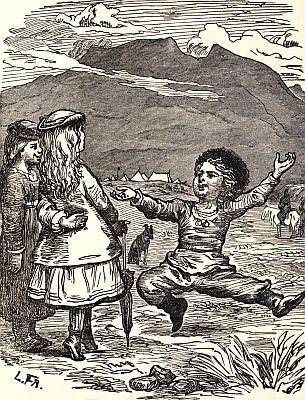
While he jerked out his arms and legs as if they were pulled by strings.
Caper, caper; dance, dance. What a wonderful dance it was, just as if the little fellow had been made of cork, so high did he bound the moment he touched the ground; while he jerked out his arms and legs as if they were pulled by strings, like the Marionettes that had once performed in the front of the window. Only, his face was all fun and life, and he did look so proud and delighted to show what he could do; and it was all in clear, fresh, open air, the whole extent covered with short green grass, upon which were grazing herds of small lean horses, and flocks of sheep without tails, but with their wool puffed out behind into a sort of bustle or panier. There was a cluster of clean, white-looking houses in the distance; and Lucy knew that she was in the great plains called the Steppes, that lie between the rivers Volga and Don, and may be either in Europe or Asia, according as you look at an old map or a new.
"Do you live there?" she asked, by way of beginning the conversation.
"Yes; my father is the hetman of the Stantitza, and these are my holidays. I go to school at Tcherkask most part of the year."
"Tcherkask! Oh, what a funny name!"
"And you would think it a funny town if you were there. It is built on a great bog by the side of the river Volga; all the houses stand on piles of timber, and in the spring the streets are full of water, and one has to sail about in boats."
"Oh! that must be delicious."
"I don't like it as much as coming home and riding. See!" and as he whistled, one of the horses came whinnying up, and put his nose over the boy's shoulder.
"Good fellow! But your horses are thin; they look little."
"Little!" cried the young Cossack. "Why, do you know what our little horses can do? There are not many armies in Europe that they have not ridden down, at one time or another. Why, the church at Tcherkask is hung all round with Colours we have taken from our enemies. There's the Swede—didn't Charles XII. get the worst of it when he came in his big boots after the Cossack?—ay, and the Turk, and the Austrian, and the German, and the French? Ah! doesn't my grandfather tell how he rode his good little horse all the way from the Volga to the Seine, and the good Czar Alexander himself gave him the medal with 'Not unto us, but unto Thy Name be the praise'? Our father the Czar does not think so little of us and our horses as you do, young lady."
"I beg your pardon," said Lucy; "I did not know what your horses could do."
"Oh, you did not! That is some excuse for you. I'll show you."
And in one moment he was on the back of his little horse, leaning down on its neck, and galloping off over the green plain like the wind; but it seemed to Lucy as if she had only just watched him out of sight on one side before he was close to her on the other, having whirled round and cantered close up to her while she was looking the other way. "Come up with me," he said; and in one moment she had been swept up before him on the little horse's neck, and was flying so wildly over the Steppes that her breath and sense failed her, and she knew no more till she was safe by Mrs. Bunker's fireside again.
CHAPTER XIII.
SPAIN
"Suppose and suppose I go to sleep again; what should I like to see next? A sunny place, I think, where there is sea to look at. Shall it be Spain, and shall it be among the poor people? Well, I think I should like to be where there is a little lady girl. I hope they are not all as lazy and conceited as the Chinese and the Turk."
So Lucy awoke in a large cool room with a marble floor and heavy curtains, but with little furniture except one table, and a row of chairs ranged along the wall. It had two windows, one looking out into a garden,—such a garden!—orange-trees with shining leaves and green and golden fruit and white flowers, and jasmines, and great lilies standing round about a marble court, in the midst of which was a basin of red marble, where a fountain was playing, making a delicious splashing; and out beyond these sparkled in the sun the loveliest and most delicious of blue seas—the same blue sea, indeed, that Lucy had seen in her Italian visit.
That window was empty; but the other, which looked out into the street, had cushions laid on the sill, an open-work stone ledge beyond, and little looking-glasses on either side; and leaning over this sill there was seated a little maiden in a white frock, but with a black lace veil fastened by a rose into her jet-black hair, and the daintiest, prettiest-shaped little feet imaginable in white satin shoes, which could be plainly seen as she knelt on the window-seat.
"What are you looking at?" asked Lucy, coming to her side.
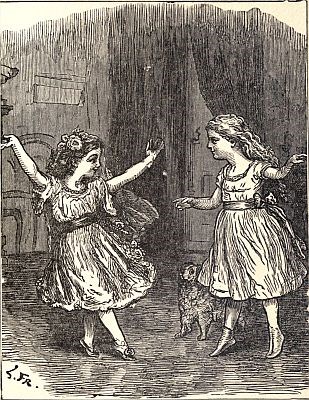
"See now," cried the Spaniard, "stand there. Ah! have you no castanets?"
"I'm watching for the procession. Then I shall go to church with Mamma. Look! That way we shall see it come; these two mirrors reflect everything up and down the street."
"Are you dressed for church?" asked Lucy. "You have no hat on."
"Where does your grace come from not to know that a mantilla is what is fit for church? Mamma is being dressed in her black silk and her black mantilla."
"And your shoes?"
"I could not wear great, coarse, hard shoes," said the little Doña Iñes; "it would spoil my feet. Ah! I shall have time to show the Senorita what I can do. Can your grace dance?"
"I danced with Uncle Joe at our last Christmas party," said Lucy, with great dignity.
"See now," cried the Spaniard; "stand there. Ah! have you no castanets?" and she quickly took out two very small ivory shells or bowls, each pair fastened together by a loop, through which she passed her thumb so that the little spoons hung on her palm, and she could snap them together with her fingers.
Then she began to dance round Lucy in the most graceful swimming way, now rising, now falling, and cracking her castanets together at intervals. Lucy tried to do the same, but her limbs seemed like a wooden doll's compared with the suppleness and ease of Iñes. She made sharp corners and angles, where the Spaniard floated so like a sea-bird that it was like seeing her fly or float rather than merely dance, till at last the very watching her rendered Lucy drowsy and dizzy, and as the church bells began to ring, and the chant of the procession to sound, she lost all sense of being in sunny Malaga, the home of grapes.
CHAPTER XIV.
GERMANY
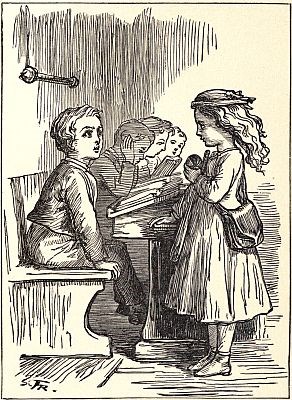
"What are you about, little boy?"
There was a great murmur and buzz of learning lessons; rows upon rows of little boys were sitting before desks, studying; very few heads looked up as Lucy found herself walking round the room—a large clean room, with maps hanging on the walls, but hot and weary-feeling, because there were no windows open and so little fresh air.
"What are you about, little boy?" she asked.
"I am learning my verb," he said; "moneo, mones, monet."
Lucy waited no longer, but moved off to another desk. "And what are you doing?"
"I am writing my analysis."
Lucy did not know what an analysis was, so she went a little further. "What are you doing here?" she said timidly, for these were somewhat bigger boys.
"We are drawing up an essay on the individuality of self."
That was enough to frighten any one away, and Lucy betook herself to some quite little boys, with fat rosy faces and light hair. "Are you busy, too?" she said.
"Oh yes; we are learning the chief cities of the Fatherland."
Lucy felt like the little boy in the fable, who could not get either the dog, or the bird, or the bee, to play with him.
"When do you play?" she asked.
"We have an hour's interval after dinner, and another at supper-time, but then we prepare our work for the morrow," said one of the boys, looking up well satisfied.
"Work! work! Are you always at work?" exclaimed Lucy; "I only learn from nine to half-past twelve, and half an hour to get my lessons in the afternoon."
"You are a maiden," said the little boy with civil superiority; "your brothers learn more hours."
"More; yes, but not so many as you do. They play from twelve till half-past two, and have two half-holidays in the week."
"So, you are not industrious. We are. That is the reason why we can all act together, and think together, so much better than any others; and we all stand as one irresistible power, the United Germany."
Lucy gave a little gasp! it was all so very wise.
"May I see your sisters?" she said.
The little sisters, Gretchens and Kätchens were learning away almost as hard as the Hermanns and Fritzes, but the bigger sisters had what Lucy thought a better time of it. One of them was helping in the kitchen, and another in the ironing; but then they had their books and their music, and in the evening all the families came out into the pleasure gardens, and had little tables with coffee before them, and the mammas knitted, and the papas smoked, and the young ladies listened to the band. On the whole, Lucy thought she should not mind living in Germany, if they would not do so many lessons.
CHAPTER XV.
PARIS IN THE SIEGE
"And Uncle Joe is in France, where the fathers and brothers of those little Prussian boys have been fighting. Suppose and suppose I could see it."
There was a thunder and a whizzing in the air and a sharp rattling noise besides; a strange, damp, unwholesome smell too, mixed with that of gunpowder; and when Lucy looked up, she found herself down some steps in a dark, dull, vaulted-looking place, lined with stone, however, and open to the street above. A little lamp was burning in a corner, piles of straw and bits of furniture were lying about, and upon one of the bundles of straw sat a little rough-haired girl.
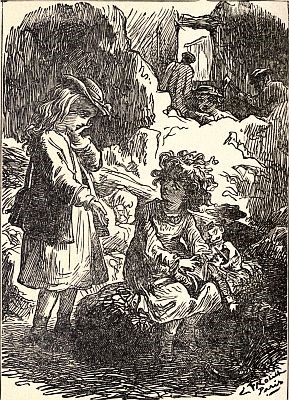
"Ah! Mademoiselle, good morning. Are you come here to take shelter from the shells?"
"Ah! Mademoiselle, good morning," she said. "Are you come here to take shelter from the shells? The battery is firing now; I do not think Mamma will come home till it slackens a little. She is gone to the distribution of meat, to get a piece of horse for my brother, who is weak after his wounds. I wish I could offer you something, but we have nothing but water, and it is not even sugared."
"Do you live down here?" asked Lucy, looking round at the dreary place with wonder.
"Not always. We used to have a pretty little house up over, but the cruel shells came crashing in, and flew into pieces, tearing everything to splinters, and we are only safe from them down here. Ah, if I could only have shown you Mamma's pretty room! but there is a great hole in the floor now, and the ceiling is all tumbling down, and the table broken."
"But why do you stay here?"
"Mamma and Emily say it is all the same. We are as safe in our cellar as we could be anywhere, and we should have to pay elsewhere."
"Then you cannot get out of Paris?"
"Oh no, while the Prussians are all round us, and shut us in. My brothers are all in the Garde Mobile, and, you see, so is my doll. Every one must be a soldier now. My dear Adolphe, hold yourself straight" (and there the doll certainly showed himself perfectly drilled and disciplined). "March—right foot forward—left foot forward." But in this movement, as may be well supposed, little Coralie had to help her recruit a good deal.
Lucy was surprised. "So you can play even in this dreadful place?" she said.
"Oh yes! What's the use of crying and wearying oneself? I do not mind as long as they leave me my kitten, my dear little Minette."
"Oh! what a pretty long-haired kitten! but how small and thin!"
"Yes, truly, the poor Minette! The cruel people ate her mother, and there is no milk—no milk, and my poor Minette is almost starved, though I give her bits of my bread and soup; but the bread is only bran and sawdust, and she likes it no more than I."
"Ate up her mother!"
"Yes. She was a superb Cyprus cat, all grey; but, alas I one day she took a walk in the street, and they caught her, and then indeed it was all over with her. I only hope Minette will not get out, but she is so lean that they would find little but bones and fur."
"Ah, how I wish I could take you and her home to Uncle Joe, and give you both good bread and milk! Take my hand, and shut your eyes, and we will suppose and suppose very hard, and, perhaps, you will come there with me. Paris is not so very far off."

